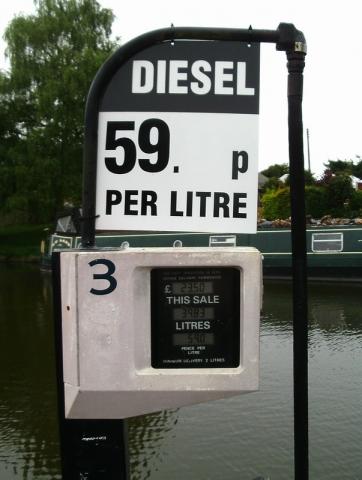Red Diesel deadline looms
June 2017 - Government has been running a consultation on the use of red diesel, which closes on 30th June 2017 and it currently seems to treat all boaters as leisure users, ignoring the needs of liveaboards, Peter Underwood reports.
The consultation document gives a list of uses of red diesel which includes ships and private pleasure craft, but makes no mention of boat dwellers, according to National Bargee Travellers chair Pamela Smith.
The NBTA believes it is important that the Government recognises the use made of red diesel by people whose boat is their home, and is urging as many people as possible to respond before the deadline.
Most sensible boatyards, like this one at Norbury Wharf, allow the boater to specify the 'split' as HMRC says but a few don't
The full rate of tax was introduced in 2008 on the use of red diesel by “private pleasure craft” for propulsion, but not for electricity generation or heating, which continues to be charged at a reduced rate, leading to the 60/40 split used by many pleasure boaters. However, those who live aboard full time and use their engines to generate electricity, heat water and may even have diesel heating systems can legitimately claim to have 90-100 per cent 'domestic' use, even though a handful of boatyards refuse to sell at that rate.
The 2008 legislation, introduced after European countries cracked down on red diesel use, made buying and selling red diesel on the waterways more complex for boaters and boatyards alike, with some boatyards imposing a blanket split between the two rather than allowing purchasers to self-declare which is the correct procedure laid down by HMRC.
The Treasury says in the consultation document that:
“At Spring Budget 2017 the government announced a call for evidence on the use of rebated gas oil (often called red diesel) in order to improve its understanding of how red diesel is used. Red diesel use makes up over 15% of total diesel use. The supply chain that links end users to the original refinery is regulated, hence government has an understanding of the suppliers and distributors of red diesel. However, the government has less information about end users and the geographic spread of red diesel use. This information is relevant because of the impact diesel consumption has on air quality, especially in urban areas where multiple uses of red diesel may be concentrated in single locations.
The government would like to understand how red diesel use has changed and how it could change in future. A significant proportion of red diesel continues to be used in urban areas, and the government believe that the consumption of red diesel in the agricultural sector has decreased.
Despite this, the government recognises the continued importance of red diesel to the agricultural sector. In the case of machinery, the government wants to understand how changes in technology and design have impacted on the use of red diesel. Diesel is being replaced in some road vehicles by alternative fuels, so an improved understanding of the extent that this could become a realistic option for non-road mobile machinery would be beneficial. The government invites evidence on red diesel to explore the quantities used across different sectors and the value of the rebate to those industries which benefit.
This call for evidence is designed to improve the data sources available to government about red diesel use and to contribute to a better evidence base for future policies. It does not imply a change in the government’s view on eligibility criteria for red diesel. Anyone with an interest in red diesel is encouraged to share their views. This includes red diesel suppliers and industries and households who benefit from the use of red diesel”.
See https://www.gov.uk/government/consultations/red-diesel-call-for-evidence
Responses should be sent to ETTanswers@HMTreasury.gsi.gov.uk
or
Red Diesel, Energy and Transport Tax Team, Business and International Tax
Group, HM Treasury, 1 Horse Guards Road, London, SW1A 2HQ.
The potential for an urban ban on red diesel is clear and it may be a hard fought battle to retain the current system.
However the Inland Waterways Association claims its 'Waterway Manifesto' attracted over 360 pledges of support from parliamentary candidates during the lead up to the recent general election.
It says: “The pledges, messages of support and our long term relationships with existing MPs and Lords gives IWA a solid base for ongoing parliamentary work to ensure that the true value of our inland waterways is understood and appreciated at Westminster.”
Unfortunately the 'Manifesto' doesn't once mention liveaboard boaters or red diesel but we can hope the IWA will be lobbying, alongside the NBTA and other boater organisations, as well as individual boaters, to keep the present arrangements, including higher percentages of 'domestic use' for liveaboard boaters.
Photos: (1st) Most sensible boatyards, like this one at Norbury Wharf, allow the boater to specify the 'split' as HMRC says but a few don't, (2nd) The IWA 'Manifesto' - it doesn't mention red diesel or liveaboards.







